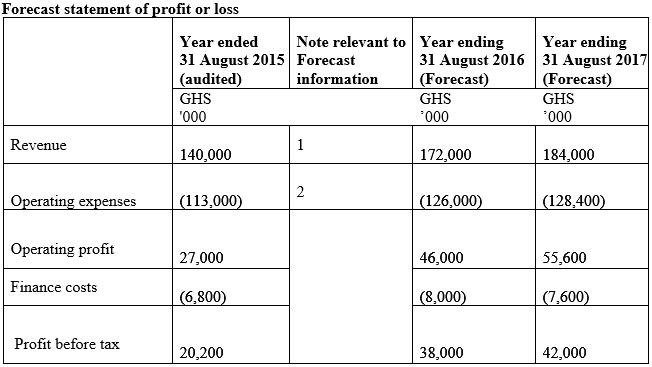Nov 2020 Q1 a(ii)
You are an audit manager with AA & Co. Chartered Accountants and Business Consultants. You have been assigned to the audit of Western Decors Ltd (WD), a long-established firm of event planning service in the city where your practice is located. The audit of the financial statements for the year ended 31 March 2019 is due to commence shortly. The audit firm is aware that the client has received a loan from the bank in April 2018 and that the bank will rely on the audited financial statements as part of the terms and conditions in the loan agreement.
The partner in charge of AA & Co. has just visited the client and made the following notes during his trip:
- The firm has a number of individual and corporate clients outside Accra and has invested heavily in recording and broadcasting equipment to allow some events to be broadcasted over the internet. This facility is now available at all events conducted in WD’s premises and is proving to be very popular. To date, no specific extra charge has been levied for this service but the Chief Executive Officer (CEO) of WD has asked us to prepare a report for him advising on whether it would be practical to charge separately for it; and, if so, the level at which the charge should be set.
- Unfortunately, WD’s main supplier of chairs went into liquidation during the year. The Partner said that they were fortunate to be able to find an alternative supplier with whom they entered into a three-year contract for the supply of chairs. At the time of signing the contract, WD considered the contract to be on very favourable terms. However, the supplier is based in Nigeria and the contract was denominated in Naira. Movements in the exchange rate now make the contract look far less attractive and the CEO has requested that we examine the contract to see if there is any way he can legally set it aside.
Required:
ii) Discuss whether the auditors may be liable to the bank in case the audit was negligently done. (6 marks)
View Solution
Negligence is some act or omission which occurs because the person concerned has failed to exercise the degree of professional care and skill, appropriate to the case, which is expected of accountants or auditors. It would be a defence to an action for negligence to show:
a) that there has been no negligence; or
b) that no duty of care was owed to the plaintiff in the circumstances; or
c) in the case of actions in tort that no financial loss has been suffered by the plaintiff.
For the bank to succeed in any case against the auditors, it must prove the following:
- The auditors owed it a duty of care since there is no contrast between the bank and Auditors, the bank must establish close proximity or sufficient relationship with the Auditors. In this case, the auditors were aware that the bank will rely on the audited financial statements in respect of the loan therefore a duty of care has been established through proximity.
- The bank must prove that the auditor has breached that duty of care by conducting the audit negligently. However, if the auditor can demonstrate to the court that it has followed the applicable auditing standards as evident by its working papers, it may not be found negligent.
- The bank must prove that it suffered financial loss as a result of its reliance on the negligent work of the auditor. (3 points @ 2 marks each =6 marks)

